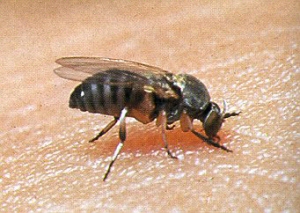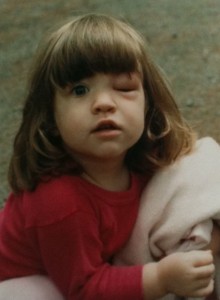Finally, a day without rain this weekend. My husband and I wasted no time getting outside to do some much-needed yard work and the black flies wasted no time making sure they got a good meal out of us. I tried to get into the zen of pulling weeds, but I guess there’s nothing zen about jumping up and down, flailing your arms about and swearing loudly that you detest the little #%@s!
When I finally gave up and escaped indoors, I discovered more than a dozen bites on my neck and shoulder, along with a couple more above my eyebrows and under each ear. At least I didn’t find any ticks crawling on me as well, but once I saw the bites they suddenly began itching. They still itch. Next time, I’ll be better prepared!
Black fly emergency preparedness
- Cover up well. Black flies like to crawl up sleeves, into waistbands, under socks and up pants
- Wear light-colored clothing
- Wear a bandana around your neck
- Wear a shoulder-length head net
- Work outside in the early morning or late evening when they are supposed to be less active. (Of course, you have to worry about the mosquitoes at night.)
- Try using a mosquito repellent, although you may need to keep reapplying
Black fly bites hurt because the fly cuts a hole in the skin and injects anticoagulants to make a larger pool of blood from which to feast. GROSS, I know! Some people don’t seem to be bothered at all by the bites, while others are more sensitive. When my daughter Katharine was a toddler her eye became so swollen from a black fly bite we took her to the ED. A little Benadryl and she was fine but what a sight, poor baby.
Robin Follette, editor and publisher of Maine Nature News, maintains a Black Fly Report, which shows that right now they are pretty bad in almost every county in Maine.
Robin says there is no precise end to black fly season in Maine, but they tend to go into “dormancy” by mid-July. Unfortunately, they come back for a spell in the fall, although usually there are fewer than in the spring. She also told me, “A hard winter doesn’t affect the number of black flies that hatch in spring. They breed in running water, which seldom freezes completely and they can survive in water as cold as 32 degrees.
More black fly trivia
- There are 1500 to 1800 known species of black flies
- About 40 species are common to Maine
- Not all black flies feed on the blood of other creatures, some are partial to nectar. In our neck of the woods, only about six species of black flies are known to bite
- The species that don’t bite still annoy because they like to crawl into ears, eyes, noses and mouths
- Black flies can spread diseases, such as river blindness but supposedly, not in the United States
- Although rare, deaths have been reported because of severe allergic reactions and from inhaling a large number of flies
- Black flies will fly up to 10 miles in search of blood
- Black flies are tenacious — oh, you already knew that!
- The black fly is the unofficial Maine state bird, according to humorist Tim Sample
Black flies are not ALL bad
- They need to breed in fresh, running water so they are good indicators of unpolluted water
- They help pollinate flowers
- They are a good source of food for certain birds, bats and dragonflies
Even so, black flies are mostly a nuisance, but in her Black Fly Report Robin encourages us to “Get out and enjoy Maine nature — even the black flies. You can tell everyone you’ve experienced the black flies and lived to tell about it.”
That’s me! And now, I’m going to soothe my itchy bites for the umpteenth time with a little witch hazel.



They are out in full force here in Warren. It seems like it’s earlier and worse but it may be that I am so glad when they are gone that I block out how bad they were. I have not found a bug dope that keeps them from biting so am resorting to a head net. Thanks for the great article.
The Maine Blackfly Breeders Association (headquarters at the Woodwind Gallery, Machias, Maine) promotes the positive traits of blackflies which are likely to be overlooked by people when they are in the midst of a healthy swarm.
It’s the female blackfly that is biting you. She needs a few drops of blood to nourish her eggs. Yes, she is aggressive.
This limerick from loyal MBBA member Monica Grabin sums up the situation nicely:
A blackfly has babies to feed,
She’s fulfilling a primary need.
It’s not personal though,
It’s just nature, and so,
Stop your complaining and BLEED!
The MBBA is sympathetic towards the people and animals who have allergic reactions to the bites. We even participated in a research project to develop a vaccine. We sent bags of blackflies, painstakingly sorted from other bugs collected in Mosquito Magnets, to Spectrum Lab in Arizona. So far I don’t think they’ve found a solution, but these things take time.
Blackflies are a food source for migrating birds and fish.
The biggest advantage to having large swarms of blackflies is they keep Maine from becoming overcrowded with people which is a huge problem in other beautiful places.
As the Director for Marketing and sales of the Maine Blackfly Breeders Association I must add that blackflies are an important part of the ecosystem. Blackflies feed the fish. the fish feed the fisherman, and the fisherman feed the blackflies. It’s all about the circle of life.
Recently we were sent this note putting the balckfly in perspective. ( Hope the attachment works!)
/Users/tilsleyr0306/Desktop/putting the blackfly in perspective.jpg
Well I guess that didn’t work so here goes:
Putting the Blackfly in Perspective:
____________________
Beholding the ice slowly retreating,the dust settlingand the fog lifting, the Lord gazed below at the bold, rock-strewn coastline and sayeth to His son, sitting at His right hand, “Jesus Christ, didn’t that come out some nifty down there.”
Whereupon the boy replied, “Yes Dad, it really did come out neat-maybe too nice, for the people who shall one day inhabit that wilderness will become conceited, arrogant, complacent in their ways and full of sloth if we make things too good for them.”
So, then, it came to pass that the Father, in His infinite wisdom, looked down upon this beautiful land and created the blackfly, for Christ’s sake….. and for ours.
…………anon 1988
___________________
May the swarm be with you!!!
Marilyn, I will be in Machias sometime this summer and will try my best to stop by your headquarters. Cathy, if anyone recommends bug dope that works I’ll share it with you!
This summer my mother got bitten by a black fly gardening and her whole eye swelled up. But now ever since she was bitten, her eye swells up every month. I don’t know why other than allergies possibly. Any ideas?
I spoke with an allergist who says it’s possible your mother is still reactive at the site of the bite, which means any trigger could reactivate it more easily, such as rubbing her eye or being exposed to an allergen.
I have high blood pressure and got bit by a black fly on my hand, it is swollen and very itchy, I’ve tried ice, it works for a while but not long. Can I take benedryl? Any ideas are appreciated.
I recommend that you talk to your doctor or pharmacist about whether or not it’s ok to take benadryl. I researched precautions and found this information:
Before using this medication, tell your doctor or pharmacist your medical history, especially of: breathing problems (e.g., asthma, emphysema), glaucoma, heart problems, high blood pressure, liver disease, mental/mood changes, seizures, stomach problems (e.g., ulcers, obstruction), an overactive thyroid gland, difficulty urinating (e.g., due to an enlarged prostate gland).
This drug may make you dizzy or drowsy or cause blurred vision. Do not drive, use machinery, or do any activity that requires alertness or clear vision until you are sure you can perform such activities safely. Limit the use of alcohol and certain other medications that cause drowsiness.
MY STORY. Yes black flys are still around my head, Dec. 2017. Some times my ears bleed at night leaves a little hole. Started in July of this year. Bug sprayed my hat, does not work. Sprayed my forehead, does not work. They will follow me around even in car, stores an in the house. Caught a few in my glass jar, Dec 21. The only thing that helps me is a rag on my head. I have read, that many people have the same problem. Im 59 white, live in Carolinas. Also white flys, feel like that are coming out of my face. No not crazy, Dr.s say they are floters. from my eyes. No No No. What to do
It sounds like a nightmare Bob. I don’t know if this will offer the help you need, but here’s the link to some information from the cooperative extension at the University of Maine: Blackfly information.